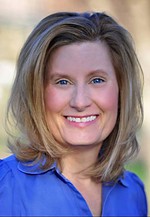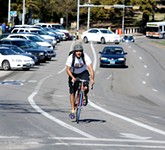Funding Balance
Political consultants and candidates talk campaign finance reform in the age of big money in politics
By Jack Craver, Fri., Dec. 11, 2015
As campaign cash totals start trickling in for the 2016 presidential hopefuls – a sizable chunk financed by deep-pocketed mega-donors – voters are given another reminder that political power and influence is increasingly concentrated among a small group of wealthy supporters equipped with their own agendas. Just 158 families and their companies have provided nearly half of the money that is fueling the candidacies of those vying for the White House, according to a recent analysis by The New York Times.
But before writing that off as just pay-to-play national politics, it's worth stopping to ask: Does Austin's current campaign finance system discourage candidates of average means from running for office?
It was significant last year when Mayor Steve Adler became the first mayoral candidate to raise more than a million dollars, a feat he accomplished entirely by soliciting contributions of $350 or less, a limit some say is too low. Not bound by stringent self-loan regulations, he also broke campaign records by loaning his campaign nearly $400,000 – a figure the average worker couldn't easily shell out. And because there are no limits on the amount that the ever-rising numbers of independent groups can spend, some worry that races will increasingly be shaped by outside special interests, rather than the candidates themselves.
The rise in spending observed in the first 10-1 elections could very well foreshadow an even more dramatic shift toward big-money politics in Austin. Not only are opponents of campaign finance regulations working to overturn the city's rules in court, but it may be only a matter of time before the political industry in Austin adapts to mirror the spending bonanza on display in many other parts of the country. If that becomes a reality, even at the smallest level of government the concerns of those most in need will likely be muted.
What's Wrong Now?
From the perspective of classic campaign finance reform advocates, Austin's system is thought to be a strong one, equipped with a number of restrictions aimed at keeping wealthy people and special interests from controlling city politics. Austin's city charter bars individuals from contributing more than $350 to a municipal campaign (a figure adjusted annually for inflation). In contrast, individuals can contribute up to $1,000 to mayoral candidates in San Antonio and up to $5,000 in Houston and Dallas.
"We think the contribution limit should be kept to a minimum," said Frances McIntyre, advocacy director for the League of Women Voters of Austin. "We think that's enough so that the big donors don't overtake the citizens."
Candidates also aren't allowed to raise money until six months before election day, a policy meant to reduce pay-to-play governance. The amount candidates can raise from donors who don't live in Austin is also currently capped at $36,000 per election (and $24,000 for a run-off election). And after the election, council members either must return unspent campaign funds to donors or give them to charity.
But not everybody is sold on the notion that such strict rules are actually in the interest of the little guy. First, there is the age-old argument that strict campaign finance limits mainly help incumbents, since those in office benefit from greater name recognition. For challengers to have a shot of taking down a better-known incumbent, they have to be able to raise money to introduce themselves to voters via media. Another criticism of strict limits is that it appears to help wealthy candidates. There are no limits on how much money a candidate can loan to his or her own campaign, meaning that rich candidates can spend freely on staff, fliers, office space, and all the other necessities of a modern campaign from day one, while a candidate of modest means has to work hard to raise money from a large base of small donors.
"It's very difficult to raise the money needed to get a message out at the $350 limit," said former Council Member Sheryl Cole, who finished a distant third in the 2014 mayoral election. "It tends to favor wealthy candidates."
That's not just sour grapes from a defeated candidate. Katie Naranjo, an Austin political consultant who worked for Adler's campaign, concurred. "Unfortunately, there are very qualified candidates who can't afford to run because the limits are so low that it forces people to put in their own money," she said.
The candidates who succeed without putting their own money on the line are increasingly rare. Of the 10 council members elected under the new 10-1 system, only two – Ora Houston and Sheri Gallo – did not lend their campaigns any money. "I didn't have any money to loan to my campaign, so that wasn't an option for me," said Houston. Luckily for her, none of her eight opponents in the primary gave heftily to their own campaigns either. "It would have been a significant disadvantage for me if one of the nine people in the race had been able to lend themselves $100,000," she said. And yet, despite her pride in having won a race on a low budget, Houston was reluctant to criticize those who did put big money into their own races. "If they're going to lend themselves $100,000, that may say to the public that they're really invested," she said.
That was the reality faced by former Council Member Mike Martinez, who lost to Adler in the mayoral race last year. Running against a wealthy opponent, he had no choice but to dip into his own savings and loan his campaign $100,000, recalled campaign manager Matt Parkerson. "We knew to compete at the level that Mr. Adler was raising and putting in, that Mike would have to make that tough decision," said Parkerson.
That's how CM Leslie Pool framed her decision to lend her campaign money. Although she did not initially plan on putting her own resources in the race, the financial demands of getting her message to 30,000 voters left her with little choice, she said. She ultimately loaned her campaign $40,500. After the election, she took back $13,000 from the campaign but is still in the hole for $27,500. "I am by no means rich; I tapped my long-earned life savings," she said. "I was fortunate to be able to put personal funds into my race, but that also motivated my efforts to do the necessary fundraising."
While Pool said she doesn't want to see a system develop in which only self-funders can run, she also believes raising contribution limits would be more damaging because it would bolster the impact of monied interests or individuals who seek to influence candidates through contributions.
Mayor Pro Tem Kathie Tovo, who's still on the hook for more than $160,000 in loans she made to her campaign in her two runs for office, echoed Pool's concerns. "My sense of it is that those higher limits really don't benefit candidates from diverse backgrounds," she said.
That's not to say that being independently wealthy is the only thing that matters in city races. Gallo, who didn't put any money into her own campaign, prevailed over two opponents, Mandy Dealey and Robert Thomas, who put big bucks into their own war chests. Thomas lent his effort $100,000 and didn't even make it to the run-off, although he didn't ultimately spend most of the money he lent his campaign and was only on the hook for $21,471, according to the report he filed with the city in July.
Raising the Limits
For self-styled progressives, any decision on campaign finance amounts to finding the lesser of two evils. Do we want a system that encourages candidates to kowtow to wealthy donors or one that favors candidates with fat wallets?
"We want a system that makes sure that influence and favor-buying is kept to a minimum," said Jim Wick, an Adler aide who managed the mayor's 2014 campaign. "But we also want a system that educates voters. And that costs money, whether it's public money or private money or candidate money."
On the national stage, some deep-pocketed candidates adore showcasing their independence from interests that others depend on, but it's probably not a sign of a thriving democracy when only the ultra-wealthy can hold public office. And yet, nobody seems willing to propose limiting the amount an individual candidate can spend of his or her hard-earned or easily-inherited dollars. "It sounds really restrictive to me to tell people what they can do with their own money," said Houston.
But while candidates, particularly on the left, are hesitant to endorse raising contribution limits, the campaign professionals are eager to say it's time for them to be raised – or even entirely abolished. "The contribution limits, I believe, are too small," said Parkerson. "You have to go to all four corners of what is now a very large city and it's very tough to get your message out" without substantial funds.
Steven Rivas, another political consultant who has run a number of municipal races, said the limits are too low, and that the six-month time period in which campaigns are allowed to raise money is too short. "We've realized that the 'Mr. Smith goes to Washington,' wear out your shoe leather, go door-to-door, isn't the reality in 2015," he said.
Naranjo suggested getting rid of contribution limits entirely, a system that is already in place for candidates running for Travis County Commissioner.
Campaigns without contribution limits essentially are similar to Super PACs, the political groups enabled by the landmark U.S. Supreme Court decision, Citizens United v. FEC, to accept unlimited funds from corporations and the rich to independently support candidates. As a result, we see candidates like Rick Perry and Scott Walker, who struggle to raise conventional campaign dollars but are nevertheless kept afloat by the whims of a handful of billionaire sugar daddies who write seven-figure checks to their affiliated Super PACs. From Naranjo's perspective, it'd be better to let the affluent contribute directly to the candidates, who can be held to account for the messages produced from the money spent. Super PACs, unlike some other political advocacy groups, are required to disclose their donors. "If you have money, in some way you're able to give it to help a candidate you support or hurt the candidate you don't," she said.
She cited the mailer attacking Adler sent out in the closing weeks of the election season by South Forward, a South Carolina-based group that supports Democratic and progressive candidates in key local races throughout the South. In 2014, the group raised and spent $312,000, a modest feat by national standards but big enough to make it a player in races across the region. Reports from the Federal Election Commission show that nearly half its money came from groups affiliated with the Laborers International Union, which backed Martinez. While the Laborers were limited, like everybody else, to giving the Martinez campaign a trifling $350, they could spend as much as they wanted independently promoting his candidacy, either on their own or through groups such as South Forward.
A number of city interest groups spent heavily on last year's races. According to an analysis of campaign spending conducted by online publication the Austin Bulldog before the December run-off, a variety of independent groups spent more than $726,000 to bolster or bash mayoral and council candidates. (Groups affiliated with the Austin Firefighters union and the Austin Board of Realtors led the pack, spending $280,887 and $132,464, respectively.) That amounts to 11.5% of the nearly $6.3 million spent overall by groups and candidates during the election cycle. Courts have consistently upheld laws that require such groups to disclose their spending. While groups in some cities and states evade disclosure by running ads that attack or praise a candidate but do not tell people how to vote, Austin requires any group that runs a communication that includes a candidate's name within 60 days of an election to report its spending. But it doesn't require them to disclose their donors. While it's pretty clear who is funding the Firefighters Association, for instance, it's sometimes impossible to know who is giving money to the many groups with vague, innocuous names, such as Austinites for Equity, Progress for Austin, and Better Austin Today.
That loophole is what a group of reform advocates seek to close with a new "dark money" ordinance that is currently being discussed by a council committee. The proposal, promoted most notably by Pool, is largely the brainchild of Fred Lewis, an attorney who has long campaigned for stricter campaign finance rules. Forcing disclosure, he said, is the only tool that "activist" courts have left intact for cities to protect the integrity of their elections from big-money groups. Lewis is also a fan of the current contribution limits, although he fears what future court decisions may do to them.
"A lot of people are cynical about campaign finance regulations," he said Lewis. "I'm not. I'm cynical about the courts."
Although there haven't been many instances of dark-money groups playing a big role in Austin politics, many politicos believe their influence could increase and be hard to combat without higher contribution limits for candidates. Rivas, who managed Edmund "Ted" Gordon's successful race for Austin school board last year, points to the increasing presence in school board races of out-of-state groups backed by wealthy individuals and companies in favor of more charter schools. One such group, Leadership for Educational Equity, which backs former Teach for America teachers running for office, spent $16,560 to support Gordon's opponent and recently put up more than $26,000 to back a candidate running for a school board seat in the Cypress-Fairbanks district, outside of Houston. Because both school districts allow unlimited contributions to candidates, the group opted to make direct contributions. But under a system with limited contributions, the group could have simply spent the money on its own.
That's why Rivas was glad his campaign was able to raise larger contributions. "If we had a limit of $350 per person, there would not be an African-American on the school board today," he said.
And yet, in spite of their obvious impact on the national stage, there appears to be encouraging evidence that outside groups can only do so much to help a candidate who can't raise money the old-fashioned way. Two notable examples came in September, when both Perry and Walker dropped out of the presidential race despite the support of Super PACs with millions of dollars in reserve. While the independent groups can spend money blanketing the airwaves with ads praising their candidates or sliming their opponents, they cannot pay for many of the most essential expenses associated with a campaign, including travel, staff, and office space.
If we've found the one thing that mega-donors can't buy, do we really want to give it up? Particularly since the significance of these less glamorous expenses is even more pronounced for candidates in local races, particularly within Austin's new, single-member districts. Now that council candidates are running for election in a (relatively) small area, rather than the entire city, buying ads on radio or TV isn't the most efficient means of communication.
How Other Cities Fund
While all of the political consultants the Chronicle spoke with conveyed utmost sincerity in arguing against fundraising restrictions, it is important to note that they have much to gain personally from new rules. "When there's less money coming in, there's less money to be made," explained Kelton Morgan, a San Antonio-based strategist.
The effect of higher contribution limits is on full display in Houston. Mayor Annise Parker raised twice as much money as Adler's record-breaking total in her 2013 re-election bid. It makes sense that Houston, which is double the size of Austin, would have campaigns twice as large. But in fact, far more people actually gave to Adler than Parker – about 3,500 vs. roughly 2,000.
You can bet that candidates in Houston remember the select few who maxed out by giving $5,000 to their campaigns. Of the $3 million raised in the Oct.-Dec. reporting period by State Rep. Sylvester Turner, one of the top contenders for mayor, more than half ($1.65 million) came from the 328 donors who maxed out to his campaign. Similarly, just over half of the nearly $2 million raised by his chief rival for the job, businessman Bill King, has come from 211 members of his $5,000 club.
In San Antonio, where individual contributions are capped at a relatively modest $1,000, Mayor Ivy Taylor received just over half of her $426,000 in contributions from the 250 donors who gave the maximum. Morgan is skeptical that lower contribution limits make influence any more accessible to the masses. "The 'little people' can't give $500 any more than they could $2,500," he said. "The game hasn't changed – it just got cheaper to buy access."
Austin seems to belie that analysis, however. It's hard to imagine that being one of the more than 2,300 people who gave $350 to the Adler campaign buys you much influence. "If you asked the mayor if somebody donated to his campaign, he probably wouldn't know," said Jim Wick, Adler's campaign manager.
Indeed, it's likely Adler doesn't know that Joe Basel and Heather Giles, a husband-wife duo best known for orchestrating hidden-camera operations most often intended to embarrass liberal or Democratic groups, donated to his campaign. (Recently, Basel and his American Phoenix Foundation claimed to have covertly recorded Texas legislators; the unpublished footage is said to expose "political hypocrisy.") Reached on Twitter, Basel said he was simply picking the best candidate in the race, but that he would shift his support to conservative Council Member Ellen Troxclair if she challenged Adler.
That's certainly not to say that Austin's strict limits don't allow for certain interests to exert influence. A look at Adler's donor list shows a heavy representation of those in the real estate and development industries, which is typical of city races. And unsurprisingly, Adler, a prominent attorney, also received a substantial amount of money from the legal community.
Testing the Rules
But while Austin appears to have very strict campaign finance rules, it's far from clear that the city is able to enforce them or whether they will continue to exist for much longer.
In last year's elections, only three candidates took advantage of the Austin Fair Campaign Fund, a pot of city money that is doled out to candidates who agree to abide by certain fundraising and spending limits. But the Austin Bulldog suggested two of them – District 3 Council Member Pio Renteria and his opponent (and sister) Susana Almanza – weren't entitled to the funds because they signed the contract well after the deadline. The city never asked for the money back from Renteria, though Almanza did return $10,000 to the city after the Bulldog pointed out that she had donated leftover campaign funds to her own nonprofit. Rivas, who was managing the campaign of Shaun Ireland, another candidate in the same race, is still smarting over the rule violation. "There's nobody at City Hall who says 'This campaign finance report has been filed incorrectly,'" he said.
The Ethics Review Commission, which is tasked with overseeing campaign finance violations, is a board of volunteers without the resources to fully investigate violations in a timely manner, said Rivas. "We can argue about raising or lowering contribution amounts, but we have to know what our expectations are of the commission," he said. Among other things, he suggests that the panel have a full-time special prosecutor or investigator who looks into violations.
But even if the commission had more resources, its power will likely remain limited. Its limitations were recently on display in a case involving Council Member Don Zimmerman, the brash Tea Partier from Northwest Austin. After unanimously finding that he had violated campaign finance law by not filing two required (and relatively obscure) forms, the commission voted to levy the second-most severe sanction at its disposal: a written reprimand.
The most serious sanction would have been a written censure. The commission has no authority to level civil or criminal penalties. Nor does it typically pursue violations unless it receives a complaint. Ideally, explained Commission Chair Austin Kaplan, the commission's public finger-wagging would prompt better behavior. "I think there's a natural instinct, especially among elected officials, to not want to be reprimanded by the Ethics Commission," he said.
If anything, the ethics complaint appears to have emboldened Zimmerman, who didn't even show up to either of the hearings on the matter, an unprecedented snub that Kaplan cited in recommending the more severe sanction.
Instead, Zimmerman sent his attorney, Jerad Najvar, to argue that certain parts of city campaign finance code were too vague and that requiring candidates to file the two forms could amount to an "unconstitutional burden" on those seeking office.
In a separate matter, Najvar is representing Zimmerman in a lawsuit against the city that seeks to strike down a number of its campaign finance regulations. Zimmerman hopes to overturn the "blackout" period on fundraising, the caps on contributions from nonresidents, and the requirement that officeholders give away their remaining campaign funds. The suit alleges that all of those rules are unconstitutional limitations on a candidate's speech.
The case, which is currently set for a Dec. 14 trial in federal district court, is by no means a lost cause. In January, U.S. District Judge Sim Lake issued an injunction against a similar blackout period in Houston after it was challenged by a candidate represented by Najvar. City officials didn't contest the ruling and stopped enforcing the blackout period, setting off an immediate fundraising frenzy.
The graver threat to Austin's campaign finance landscape may not be a change in political law, but a change in political culture. While there were plenty of national politicians, including President Obama, who decried Citizens United, it was only a matter of time before they begrudgingly (and later enthusiastically) started playing the new game it created. With just a little bit more time, perhaps local pols will follow suit. It could one day seem more alluring for the mayor of the nation's 11th largest city to stop soliciting donors for $350 contributions when he could get an ally to set up an independent group to shake down the biggest developers in town for five- (or six-) figure checks.
Kaplan, the Ethics Commission chair, said the evolution is inevitable. "If that playbook works anywhere, it's going to be exported everywhere," he said.
Got something to say on the subject? Send a letter to the editor.

















